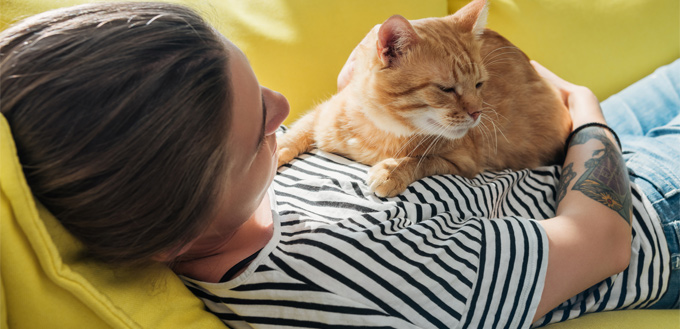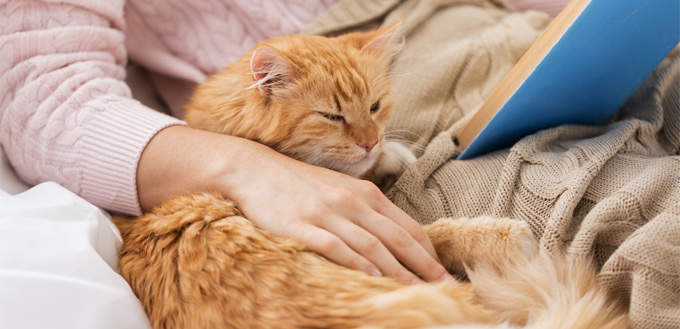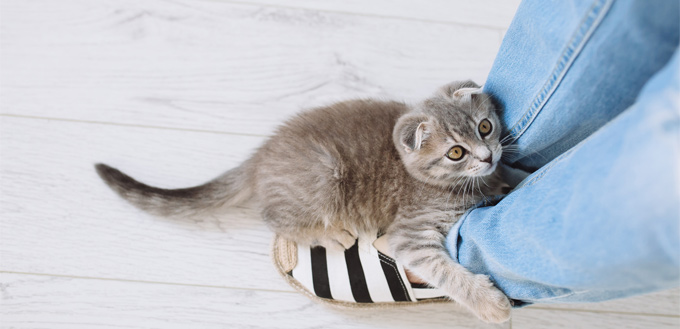We have been sharing our joys and sorrows with our cats for the past 9,500 years. And while we can say that we know them quite enough to predict their behaviors and temperaments, there is still one aspect of their being that has eluded us all this time: the inner workings of the feline brain. More to the point, all of us are also interested in knowing what our cats think of us so that we will also be able to fully comprehend what needs to be done to make our feline-loving lives a lot easier.

Cats Think of People Differently Than Dogs
There has been a lot of research into understanding the complex structure and function of the feline brain. And while none of us are gifted with the ability to read what our feline friends are thinking, scientists have made a remarkable observation based on cat behavior. Cats don’t necessarily think of humans as different.
This observation is more pronounced when compared to the way a dog behaves when in the company of humans and in the company of fellow dogs. Whenever a human enters the picture, dogs automatically change the way they interact. They are friendlier. They somehow observe ‘decorum’ whenever interacting with us. The ways in which dogs play or interact with humans are way different from the manner in which they play and interact with other dogs. This behavior suggests that dogs see humans as inherently different from them.
Unfortunately, the same behavioral change in the presence of humans is not seen in cats; well, not yet anyway. University of Bristol cat behaviorist and Cat Sense author John Bradshaw explains that feline behavior researchers have yet to discover a similar behavioral adaptation in cats. Sure, we see cats putting their furry tails high up in the air, sitting beside us, rubbing their bodies against our legs, and even grooming us, but these behaviors are also what they do to other cats.
The Mother Cat-Kitten Relationship-Driven Behavior
What is more surprising about the behavior of cats, which should give us an idea in what is going on in their brains or if do cats love humans at all is that these behaviors are believed to have been instinctual responses developed when cats were still young kittens.
These cat behaviors – jumping up, licking, rubbing, and even to seemingly ‘talk’ to us – are believed to have originated from the close relationship between mother cats and their respective kittens. It is believed that ancient felines were solitary animals. It was very rare to find cats in groups except perhaps for a pride of lions. But if you look at other big cats like tigers, cougars, pumas, and the like, they don’t usually stay in a large group. They’d rather stay alone.
It is because of this solitary nature of their existence that the only close relationship that kittens ever knew was that of its mother and littermates. The very limited interaction that they get from other cats could help explain the otherwise limited behavioral adaptations seen in cats when they are faced with a being other than their mother cat and littermates. This remains unproven, of course. But the way cats are behaving right now, it is the most plausible explanation for the difference in behavioral responses when compared to dogs.
There is another point which other cat behaviorists point out as supporting the mother-kitten relationship theory. It is a general observation that there are certain situations when a cat purposely cries in a very distinct way that it closely resembles the cry of a baby. This sound is thought to produce a characteristic response which is equated with ‘motherliness’.

Cats Do Think of Humans
So, what do cats think about their owners? Following the mother cat-kitten relationship-driven behavior argument, it is safe to conclude that cats think of us nothing more than their mother cat. And as mothers of these kitties, they expect us to give them all the love that they once enjoyed as kittens. This pretty much explains almost everything and can also help answer the question, ‘do cats love humans?’
We often observe our cats staring at us ‘intently’. This has something to do with that kitten instinct related to watching its mother do the things in their little hideaway. The little cat knows that sooner or later, its mommy cat will have to send it away to live on its own. As such, the little one has to observe what the mother cat is doing and learn as many things as possible. From stalking and catching prey to avoiding becoming the prey themselves, kittens have to learn by observation.
This is the same thing when cats try to stare at us or look at their owners. They are trying to figure out, learning what we are doing. More importantly, they are looking for that one specific person who always gives them food. They also try to associate this with other circumstances such as the times of day that they are fed and other behaviors that they see from us.
For example, if we feed our cats anytime between 6 and 7 in the morning which also happens to coincide with the alarm on your clock, they’ll learn such cues to mean it’s already mealtime. And if only one person has been giving them their food all this time, they will be a lot closer to that person simply because it is he or show who feed them.
For us, we often interpret this as being affectionate and extremely loyal for a very specific person. In the mind of the cat, however, it doesn’t think about loyalty. As a matter of fact, it doesn’t have any idea as to what loyalty means. What it does understand is that this ‘special person’ is the one who gives it its food. For the cat, this person is nothing more than a very big cat that provides food in pretty much the same way as mother cat feeds its kittens.
Here’s the thing. Cats understand the implications of our actions based on what they see. However, this doesn’t automatically translate to their understanding of what we are to them.
Cats, Socialization, and Love
This brings us to the question, do cats love us or are we the only ones thinking that they do?
Make no mistake; cats are sociable animals, although don’t expect them to be as social as dogs. Canines have existed in packs and they have learned the importance of a highly organized social structure in their survival. Cats, on the other hand, only have their littermates to hang out with as kittens. That is why cat fights are relatively common. It is also for this reason that early cat socialization may be necessary if ever you want your kitty to behave a bit differently from other cats.
Does this mean our cats don’t love us? Love is very subjective. Different folks put different meanings to the word. Most of us will interpret our cat’s behavior of purring and grooming us as their way of showing they love us. But let us also not forget that this behavior has its origins in the mother cat-kitten relationship. They are displaying these behaviors not really because they ‘love’ us, but rather it is what they have observed from their respective mothers. They, therefore, have this belief that such behaviors are a part of being a cat.
There is also this observation that cats like to lie down near an individual with its back turned to that person. For some folks, they may find it rude. But cat behaviorists say this behavior has something to do with the cat’s acceptance of the person as being safe. They consider themselves both as predator and as prey. They know how predators stalk and pounce on their prey. As such, when they assume the role of prey, cats will usually have their backs turned on a wall or something they know is safe or where a predator will least likely come from. They then face in the direction where the threat (predator) can possibly spring forth.
That being said, if a cat lies in front of you or near you and then turns its back on you, you should rejoice since this cat obviously trusts you enough not to consider you as a threat. It’s one of those very subtle cues that a lot of people, even cat lovers, typically overlook or misinterpret.

What Cats Really Think About Us
Cats think about their owners, too; that’s for sure. However, don’t expect it to be similar to how dogs think of humans in general, and their owners in particular. Cats have a very different set of behaviors that is very difficult to decipher, let alone comprehend. What is known is that the behaviors that we see in cats today can be easily traced back to their earlier experiences as kittens; more specifically, their interactions and relationships with their mothers and littermates.
We still have a long way to go in terms of understanding what cats think of us. What is sufficient for now is that they do think of us, not as humans, but as big mother cats.
Related Post: How to Tell If Your Cat Is Left or Right-Handed





